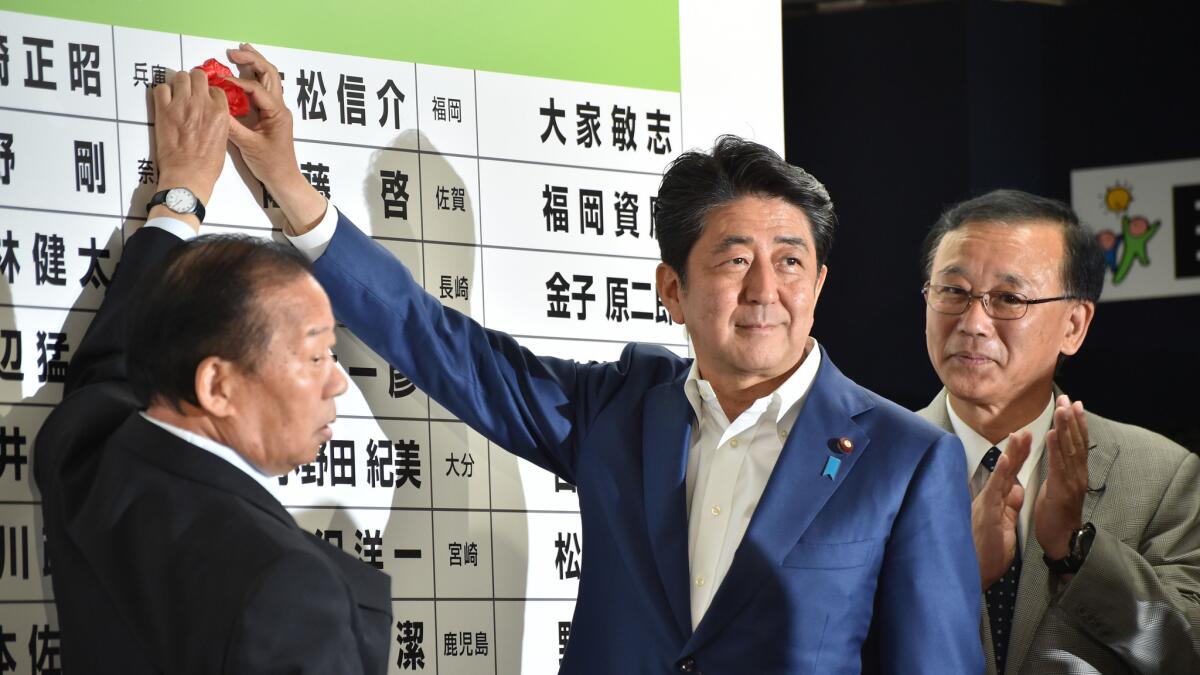Japan’s ruling coalition wins election, opening door to constitutional change

- Share via
Reporting from Tokyo — Prime Minister Shinzo Abe’s ruling Liberal Democratic Party and its coalition partner won a majority of contested seats in Japan’s parliamentary election Sunday, opening a path for them to amend Japan’s postwar pacifist constitution.
The results were also an endorsement of Abe’s plans to revive Japan’s flagging economy, the issue that he built his campaign around. Abe has been trying for four years to get the political support to fully implement “Abenomics,” a plan for structural reform of the economy through fiscal stimulus and monetary easing.
“In the near term, the most pressing question will be finalizing a stimulus package, which will occupy the ruling coalition for the next several months,” said Tobias Harris, a Japan analyst at the political risk advisory firm Teneo Intelligence.
Half of the seats in the upper house of parliament were up for grabs in Sunday’s election. Although the lower house is considered more powerful, the election was significant because it appeared to give Abe’s Liberal Democrats and their allies a two-thirds majority in both houses. Previously, they had a two-thirds majority in the lower house, but only a simple majority in the upper chamber.
With two-thirds majorities in both houses, Abe could initiate a constitutional amendment – if his parliamentary allies are on board. Harris said it seemed likely that the Komeito party, Abe’s coalition partner, would block a constitutional amendment, though Abe indicated after the vote that he would push for debate in parliament.
The Japanese Constitution, written by the United States after Japan’s defeat in World War II, limits its military to a self-defense role, something Abe would like to change. Liberal Democratic Party leaders have also called for an emergency powers clause in the constitution, which would give the prime minister sweeping power during a crisis.
The party’s proposed constitution has been criticized by some legal scholars for not only ending pacifism and allowing Japan’s modern military to do more than merely defend the Japanese homeland from attack, but also for limiting the rights to free speech or freedom of the press “when it is not in the public interest.”
But some Japanese agree with Abe’s views on security because of growing fears about terrorism, the recent missile launches by North Korea and China’s military assertiveness.
The election was also significant because it was the first parliamentary election since the voting age was dropped from 20 to 18. Exit polls showed the Liberal Democrats benefiting most from the youth vote. According to Kyodo News service, 40% of 18- and 19-year-old voters voted for the Liberal Democratic Party, while the Democratic Party – the main opposition party – received only 19.2%.
Young voters were credited with helping raise overall voter turnout to 54.7%, about 2 percentage points higher than in 2013 elections.
Robert Dujarric, professor and director of the Institute of Contemporary Asian Studies at Temple University Japan in Tokyo, said the win reflected voters’ disenchantment with the opposition, rather than their excitement about Abe’s policies.
“The public is old. It doesn’t want change,” he said. “It doesn’t want what Japan really needs — more structural reform, less money for the old and more funding for families and children.”
Adelstein is a special correspondent.
ALSO
Preacher who called 9/11 an ‘inside job’ comes under scrutiny after Bangladesh attack
As Japan’s population shrinks, bears and boars roam where schools and shrines once thrived
UPDATES:
7:44 p.m.: This article has been updated with voter turnout data.
This article was originally posted at 6:21 p.m.
More to Read
Sign up for Essential California
The most important California stories and recommendations in your inbox every morning.
You may occasionally receive promotional content from the Los Angeles Times.










